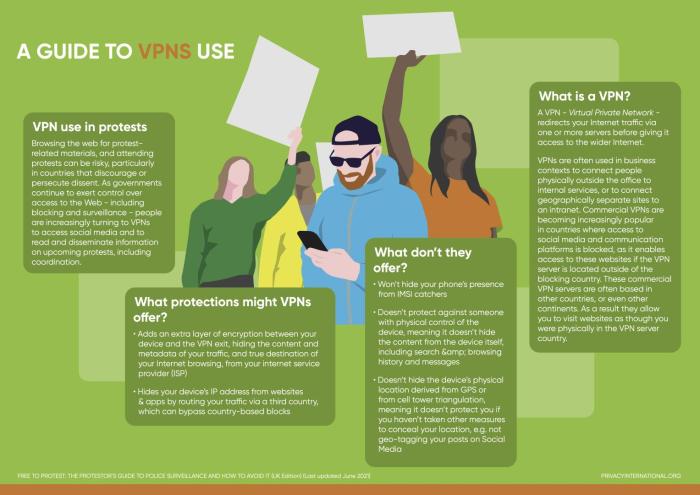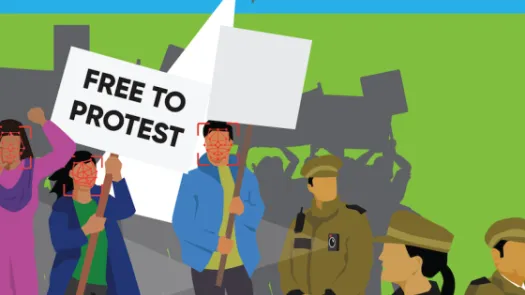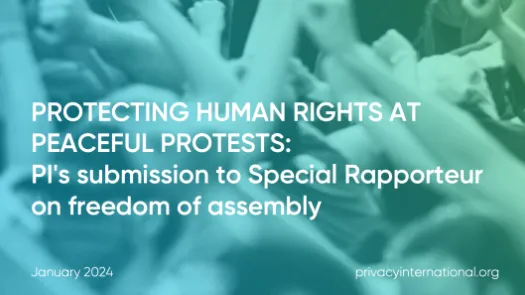
A guide to VPN use
Browsing the web for protest-related materials, and attending protests can be risky, particularly in countries that discourage or persecute dissent. As governments continue to exert control over access to the Web - including blocking and surveillance - people are increasingly turning to VPNs to access social media and to read and disseminate information on upcoming protests, including coordination.

What protections might VPNs offer?
- Adds an extra layer of encryption between your device and the VPN exit, hiding the content and metadata of your traffic, and true destination of your Internet browsing, from your internet service provider (ISP)
- Hides your device’s IP address from websites & apps by routing your traffic via a third country, which can bypass country-based blocks
What don’t they offer?
- Won’t hide your phone’s presence from IMSI catchers
- Doesn’t protect against someone with physical control of the device, meaning it doesn’t hide the content from the device itself, including search & browsing history and messages
- Doesn’t hide the device’s physical location derived from GPS or from cell tower triangulation, meaning it doesn’t protect you if you haven’t taken other measures to conceal your location, e.g. not geo-tagging your posts on Social Media
What is a VPN?
A VPN - Virtual Private Network - redirects your Internet traffic via one or more servers before giving it access to the wider Internet.
VPNs are often used in business contexts to connect people physically outside the office to internal services, or to connect geographically separate sites to an intranet. Commercial VPNs are becoming increasingly popular in countries where access to social media and communication platforms is blocked, as it enables access to these websites if the VPN server is located outside of the blocking country. These commercial VPN servers are often based in other countries, or even other continents. As a result they allow you to visit websites as though you were physically in the VPN server country.
How could a VPN help me…
…as a protester?
A VPN allows for access to blocked or other sites, including those used to disseminate details about a protest.
…as a protest organiser?
A VPN hides your true IP address from social media, websites and apps, offering a degree of anonymity from the platforms themselves.
…as an activist?
A VPN obscures your Web traffic from your ISP, and protects your real IP address from being discovered in a government request to a platform, or a hack/leak of a platform.
Limitations to VPNs’ protections
- Commercial and free VPNs make many claims about “privacy” and “security”, but there are limits to what they offer.
- In reality you’re switching who you trust to see the true source and destination of your Internet traffic, from your phone company, ISP or WiFi service to the VPN provider.
- VPN traffic has to access the Internet from a server at some point, and these servers are ripe for observation by nation states and other malicious actors.
- Like all technologies, VPNs can go wrong. This could mean not routing traffic, or not routing certain types of traffic which could still allow you to be identified by a sufficiently motivated attacker. You may not be aware of this failure, meaning you may accidentally post to social media or visit a website using your real IP address, through your usual ISP.
What to think about when choosing a VPN
-
Jurisdiction of the VPN provider is key. Look for VPNs located in countries with strong data protection and privacy laws.
-
What does the VPN require of you – particularly if it’s free. Some VPNs will allow others to use your device as their tunnel’s exit, meaning that their traffic will appear as coming from your device. This could be problematic for you if, for instance, another user engages in illegal activity.
-
There are other steps you can take too, but none are perfect solutions. If you are communicating with others about protests, your information may still be accessed by other means such as mobile phone extraction technology and cloud extraction technology. You can also still be identified in a crowd through authorities’ use of facial recognition cameras.
-
To find out more about how law enforcement agencies can monitor you during protests, read the rest of our protests guides here.
You can download this guide as a jpeg by saving the image below, or by downloading the pdf version in 'Attachments'.




